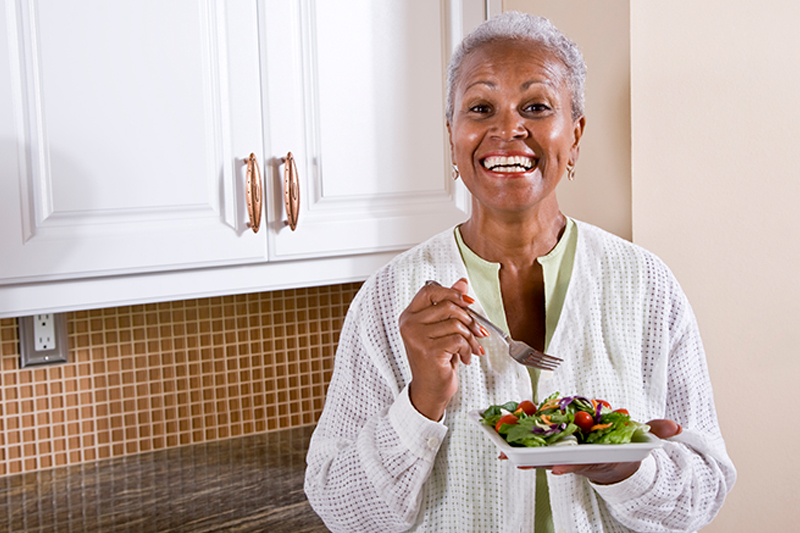
Healthy eating for older adults can be impacted by a variety of challenges.
Remember family dinners at Grandma’s house? The enticing scents wafting from the kitchen would draw everyone in to gather at the table to enjoy her home cooking. There were always a lot of leftovers for future meals or late-night snacks.
Yet for a number of seniors, these sorts of family meals are few and far between. Healthy eating for older adults can be impacted by a number of obstacles to good nutrition, such as:
- Not wanting to bother with preparing a nutritious meal for just one or two people
- Health conditions that make it difficult to tend to the tasks of grocery shopping and cooking
- Medication side effects that impact appetite or how food tastes
- Lack of smell and/or taste
Overcoming the Hurdles to Good Senior Nutrition
For seniors facing the difficulties above, or any others, these tips will help.
- If loneliness during mealtime is an issue, older adults can network with friends for potluck dinners, testing new recipes together, or going out for meals. Other choices include congregate meals at senior centers, Meals On Wheels, or a companion from At-Home Care Company, offering trusted home care in Des Moines, Iowa and nearby areas.
- Grocery shopping and preparing meals could be taxing. There are a number of companies that now offer nutritious, ready-made meals delivered straight to your door. Grocery delivery service or curbside pickup are also great for seniors. A caregiver from At-Home Care Company is also available to pick up groceries.
- Loss of smell or taste might make foods unappetizing, but adding herbs and spices to recipes can help. Make sure to limit salt, however. Try bright-colored vegetables and fruit in differing textures for textural and visual appeal.
- Review medications with the prescribing physician to find out if there are other treatment options that won’t impact the older adult’s appetite.
Simple Steps to Healthy Eating for Older Adults
These tips can help ensure seniors are on the right track to a healthy diet.
- Choose foods that are typically loaded with nutrients but lower in calories, such as fruits and vegetables, whole grains, lean meats and seafood, beans, seeds, nuts, and fat-free or low-fat dairy products.
- Skip (or at least limit) the quantity of empty calorie foods, such as cookies and other baked goods, candy, chips, soda, and alcohol.
- Stay hydrated. Many older adults lose the sense of thirst when they get older, so it’s important to drink sufficient water each day, whether thirsty or not.
- Physical activity often helps stimulate appetite. Consult with the physician for a recommended exercise plan.
For additional helpful resources pertaining to maximizing senior nutrition, as well as for hands-on help with overcoming the challenges being faced, contact At-Home Care Company, the trusted provider of home care and dementia care in Des Moines, IA and nearby communities at 515-292-2650.
